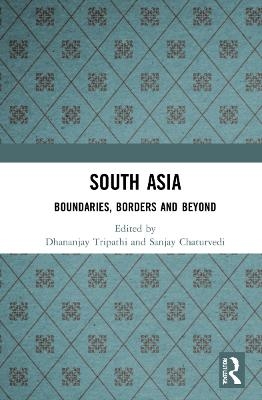
South Asia
Routledge (Verlag)
978-1-032-11356-2 (ISBN)
The chapters in this edited volume have been contributed by both renowned as well as young emerging scholars, looking into the borders and boundaries in South Asia. Each chapter offers new perspectives and insights into themes like trans-Himalayan borderlands, India-Pakistan physical and mental borders, Afghanistan-Pakistan border and numerous social boundaries that we see in everyday South Asia.
The chapters in this book were originally published as a special issue of the Journal of Borderlands Studies.
Dhananjay Tripathi teaches International Relations at South Asian University, New Delhi. He specializes in South Asian Borders. He has authored one, edited one and co-edited one book, and also contributed in several edited volumes and reputed international journals. He is editorial board member of prestigious journals like Journal of Borderlands Studies (Routledge); Alternatives: Global, Local, Political; and BIG Review. Sanjay Chaturvedi teaches International Relations at South Asian University, New Delhi. He has extensively written on South Asian borders, partition, critical geopolitics and maritime South Asia. He has authored two, co-authored three and co-edited eight books. Chief Editor of Journal of the Indian Ocean Region (Routledge), he serves on the editorial board of several reputed international journals.
Introduction – South Asia: Boundaries, Borders and Beyond 1. Re-engaging the “International”: A Social History of the Trans-Himalayan Borderlands 2. Borders and Bordering Practices: A Case Study of Jaisalmer District on India–Pakistan Border 3. Portraying the “Other” in Textbooks and Movies: The Mental Borders and Their Implications for India–Pakistan Relations 4. Pakistan’s Border Policies and Security Dynamics along the Pakistan–Afghanistan Border 5. The Status of Durand Line under International Law: An International Law Approach to the Pakistan-Afghanistan Frontier Dispute 6. No Mountain Too High? Assessing the Trans-territoriality of the Kailash Sacred Landscape Conservation Initiative 7. Analysis of a Parallel Informal Exchange Rate System in Indo-Bhutanese Border Towns 8. Gaining a Ghetto: The Resettlement of Partition-affected Bengalis in New Delhi’s Chittaranjan Park
| Erscheinungsdatum | 26.11.2021 |
|---|---|
| Verlagsort | London |
| Sprache | englisch |
| Maße | 174 x 246 mm |
| Gewicht | 453 g |
| Themenwelt | Sozialwissenschaften ► Politik / Verwaltung ► Europäische / Internationale Politik |
| ISBN-10 | 1-032-11356-1 / 1032113561 |
| ISBN-13 | 978-1-032-11356-2 / 9781032113562 |
| Zustand | Neuware |
| Haben Sie eine Frage zum Produkt? |
aus dem Bereich


